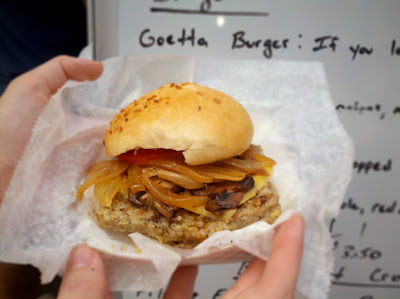Cincinnati's Regional Cuisine: Goetta
One of my favorite things about traveling is getting the opportunity to explore regional cuisine. And something fun that few people seem to realize is that you don't have to go far to experience local specialties - I live in Chicago, and driving a few hours in the Midwest brings pasties in Northern Michigan, walleye near Lake Erie, and goetta in Cincinnati. Goetta. I'd visited Cincinnati before while touring and was then introduced to the local style of chili (Skyline Chili makes a popular example), but I'd never heard of goetta. Thankfully, last weekend rectified this grave omission.
You probably won't find goetta anywhere outside of Northern Kentucky and the greater Cincinnati area - the dish likely has German-American origins, though some theories also posit that it has roots as a haggis substitute, brought to Ohio via Scots-Irish migrants by way of Kentucky. (Got that?) The Germans love their sausage, and goetta would make some sense as an outgrowth of that tradition: it's essentially a sausage made from pork (or pork and beef), spices, onions, and steel-cut oats. That last ingredient is especially important: goetta must be made from steel-cut (pinhead) oats, not your typical garden-variety oats found in the supermarket aisle. It's not salty, and it's usually served in patty form from the sliced sausage.
Cincinnati loves its goetta - there are entire festivals dedicated to the stuff. Imagine goetta pizza, goetta cheddar cheese, goetta jambalaya - so it wasn't surprising that a stall at Findlay Market featured goetta burgers. No matter how skeptical you might be about oats and pork sausage - I couldn't imagine what this combination would taste like, especially on a hamburger bun - given the opportunity, you need to try it. It's surprisingly delicious, and I'm already wishing I could go back for more.

Goetta sounds quite yummy, but I am far from both Kentucky & Ohio right now. Your posts always make me hungry, though. I love steel cut oats...
ReplyDeleteThanks for participating in the Traveler's Show & Tell blog carnival over at Mental Mosaic. I hope to see you there again sometime. :)
~Tui
Howdy Dawn,
ReplyDeleteI wanted to say thanks again for submitting to the BT Blog Carnival, and also congratulations! Your article has been hand-selected and was included in the 8th BT Blog Carnival which was published today.
If you could retweet, stumble, or like this edition of the blog carnival, I would really appreciate it. :)
Thanks again!
This comment has been removed by the author.
ReplyDeleteIt looks delicious. I heard that there are many great dishes in Cincinnati, especially their pizza. I will try their food some time.
ReplyDeletenyc catering
I couldn't agree with you more. One of the things that I love about traveling is food! I get the chance to explore different food from different culture.
ReplyDeletecatering new york
I’ve been researching the ‘history’ of Goetta with my partner, and we also noted this very odd circular reference back to the mid-west as the origin (seems like a cover up story / conspiracy). I’m wondering if you have some hard proof (old Irish recipes) that might be able to show this adaption of their puddings or haggis into Goetta. There is an extremely rich but muzzled Irish history in Northern KY, in that Irish emigrants were pretty brutally treated and usually served as maids to wealthier [likely German] families. The running theory we have is that the Irish adapted the crappy German recipes for Grützwurst, Knipp, etc into something that more closely resembles their white pudding (almost a perfect ‘genetic’/recipe and presentation match). The logic being that Germans wouldn’t have eaten pudding knowing it was an Irish food staple, so a new more German sounding name was given to the food when combining the two recipes: pudding ~ Grützwurst. Seems like, with some proof, history could be rewritten a bit here. “Goetta, the greatest Irish-German collaboration of the 19th century that everyone ignored.”
ReplyDelete